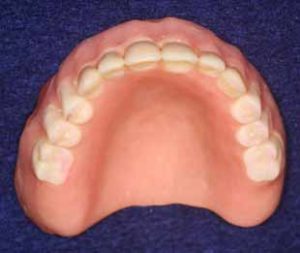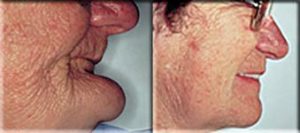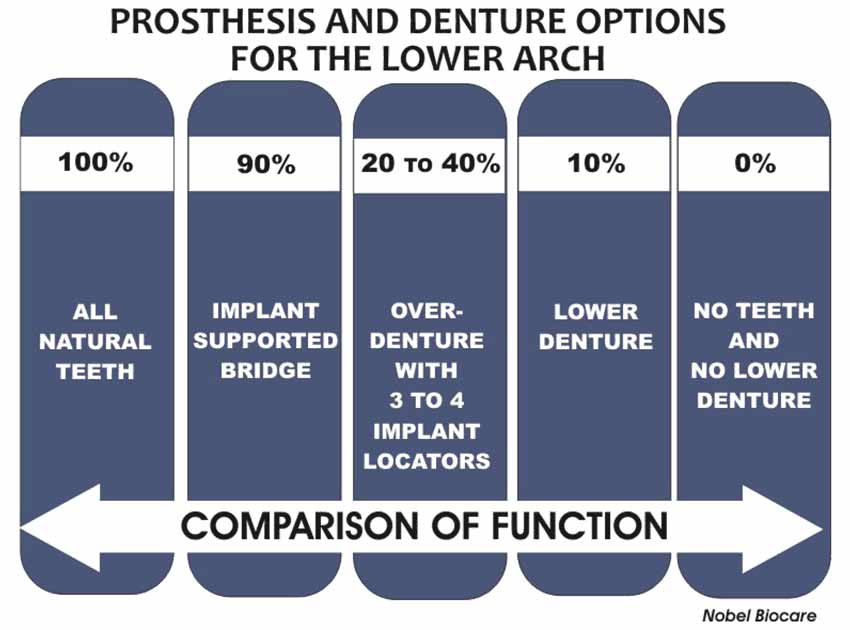Dental patients often wonder which approach is the best for them: removable dentures, tooth supported fixed bridges, overdentures or dental implant supported bridges. Here’s a comparison of several of the most popular choices. While some prosthesis types are initially less expensive, they can become costly due to frequent repairs and adjustments. Comfort, appearance and function are major factors when making a choice. Bone loss is in the jaw can cause some prostheses to eventually lose their fit.
Removable Dentures
Initially, a removable denture can look esthetically attractive and natural. A denture is less costly than non-removable solutions such as bridges and dental implants. For some patients, because of physical health or economics, it is the only option available to them.
Research and technology make it possible to produce dentures that look better, feel better, and last longer. In the same comfortable and comforting environment where thousands of permanent smiles have lighted faces, patients requiring dentures can now select from a full menu of removable dentitions.
Removable dentures are simply an interim solution for many patients. Due to the problems described below, many patients eventually opt to pursue dental implant treatment.

Long term dentures eventually become costly. Because oral bone continues to shrink even with dentures in place, that first set of dentures will begin to loosen like old loafers and develop mobility. The first fix is more glue in the mouth. Then the lab will reline the dentures. Eventually another set will be required. And then another and perhaps another. The skin on the face cannot keep up with the shrinking gumline and wrinkles develop. The facial profile sags. Enter psychological cost. There is no peace of mind that this deteriorating condition will ever come to conclusion. Consider also that time is money and much precious time may be spent in pursuit of comfortable dentures with an acceptable appearance.
Overdentures
An overdenture is a removable denture supported by a small number of natural teeth or dental implants. There are two common types of overdentures: bar- supported and implant locator. Overdentures provide more retention than removable dentures.
Tooth Supported Bridge
A tooth supported bridges have many advantages over removable dentures. In particular, there is security in knowing that teeth are not going to move around and fall out during a conversation or meal. A more natural esthetic effect is possible. Patients can eat a wider variety of foods without worry. Tooth supported dentures require less time to maintain.
Advantages of Tooth Supported Fixed Bridges
- Security – A tooth-supported fixed bridge is not removable by patient.
- Usually more natural esthetics than a removable denture.
- Better chewing ability than removable dentures.
- No denture material covering the roof of the mouth or under the tongue.
Disadvantages of Tooth Supported Fixed Bridges
- Bone loss occurs where natural teeth are missing.
- Bone continues to deteriorate behind the false teeth due to loss of roots.
- Healthy adjacent teeth are compromised because they must be cut down so that the bridge can be attached to them.
- Potential for gum disease increases.
- Possible need for root canal treatment and post and core, adding additional time, discomfort and cost to the treatment.
- Long-term function is compromised.
- Long-term esthetics is compromised as gum recedes.
- Oral hygiene difficulty because bacteria can lodge around bridge.
- Potential for mouth odors.
- Decay of roots and teeth under the bridge can occur
- More costly in terms of future treatment.
Implant Supported Bridge
Dental Implants offer the best long-term solution for missing teeth. Implants provide a secure anchor and have been proven to be safe. Dental implants have ADA approval as well as considerable research demonstrating their effectiveness.
Titanium dental implants fuse to bone and, through a process called osseointegration, these implants become viable new roots supporting permanent prosthetic teeth. In dental laboratories worldwide, master technicians, who are both artists and precision engineers, custom design these milled teeth to be perfectly suited to the patient’s face, shaping and coloring them tooth by tooth.
Dental implant treatment is initially more costly than some other options, but considering the number of highly skilled professionals involved in re-creating natural teeth, the value becomes a lifelong, life-changing investment.
Advantages of Dental Implant Replacement
- Secure – The teeth are tightly anchored in the mouth.
- Stable – There is no movement of the teeth during chewing or talking.
- Reliable -Peace of mind in knowing that the teeth will not move.
- Bone growth is stimulated by the dental implant, which imitates a tooth root.
- No grinding down of adjacent teeth is necessary.
- Improved oral hygiene.
- Better breath.
- Better health with improved nutrition.
- Improved Function – Feels like a natural tooth
- Improved Esthetics – Looks like a natural tooth.

Disadvantages of Dental Implant Replacement
- May initially seem costly, but the investment value is actually less costly over time.
- Adequate bone must be present in order to place dental implants.
- Bone graft procedure may be necessary if adequate bone is not present.
Cost Comparison Per Prosthesis Types
Comparison
|
Removable |
Tooth |
Single Tooth |
| Short Term Cost |
Low $ |
High $$$$ |
High $$$$ |
| Long Term Cost | High $$ |
High $$$$ |
Low $ |
| Biologic Costs | High | High | Low |
| Esthetics | Fair |
Good |
Excellent |
| Function | Poor | Excellent |
Excellent |
| Bone Preservation |
Poor |
Poor |
Excellent |
| Hygiene Access |
Fair |
Poor |
Excellent |
| Long Term Maintenance | High | High | Low |
| Reference: Balshi TJ, Wolfinger GJ: Single Tooth Replacement: Fixed Partial Denture Vs Single Tooth Implants. Valley Forge Dental Journal, Spring 1997. | |||
